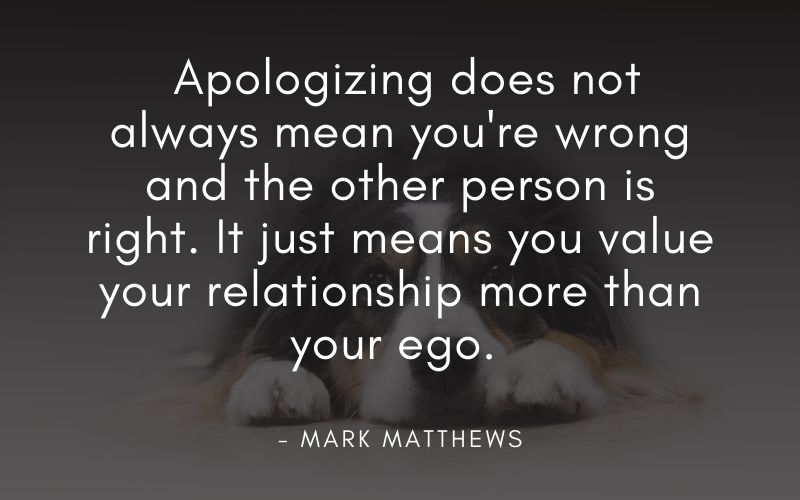You must be wondering why anyone would have to apologize when they have not done anything wrong. You are both right and wrong.
In normal circumstances, you say sorry when you hurt someone or do something wrong. However, humans, human behavior, and human relationships are so complicated that there are times when an apology is in order even when you have done nothing wrong.
However, you should know when not to apologize in a relationship. Such as when someone is mad at you for no reason.
This article takes a look at situations when saying sorry is the right choice even if you are in the clear. You will find here how to say sorry in such times.
Why should you apologize when you are right?
At times your actions are wrongly perceived by others and you are accused of wrongdoing. This makes us indignant and angry and naturally, you refuse to apologize for something you never did in the first place.
These situations can happen in relationships or among friends, at home or the workplace, or even in a public place. You feel defensive, righteous, and furious and begin to lash out at those who accuse you and are demanding or expecting your apology.
It would help if you can calm down and evaluate the situation and weigh the pros and cons of apologizing. In the heat of the moment, this is hard to manage. But you can prepare yourself for such situations and follow the script to help you deal with them the best way possible.
Let us take a look at scenarios where an apology may be demanded or expected from you despite your innocence and faultless behavior.
Relationship above ego
“We’re all islands shouting lies to each other across seas of misunderstanding.” – Rudyard Kipling, The Light That Failed
Relationships and misunderstandings go hand in hand. Even in the best of relationships, it would be impossible to eliminate mix-ups, misapprehensions, mistakes, and disagreements.
When things go downhill, it is human instinct to blame – more often the other person and at times even oneself. When your partner owns up the mistake, you would still want to milk the situation for all it’s worth and gloat and rub it in.
Pause for a moment and think about how this will impact your relationship. What do you achieve by painting your partner in a bad light? Your partner may be going through a bad phase and you can rise to the occasion and show some emotional maturity.
You are not going to lose anything by saying sorry for the painful situation you two find yourselves in. it will be proof that you value your partner and your relationship more than your own ego and your need to be right.
For the sake of unity
When you are a member or leader of a team, you may have to make sacrifices for the sake of the unity of the team or as a show of solidarity. Pointing fingers at other members and passing the buck may result in irreversible damage to the interpersonal relations within the team.
The motto of a good team should be “Win together, lose together”. Win or lose, the responsibility should be shared equally. Even when one member of the team makes a mistake that jeopardizes the work of the entire team, others should rally behind their team member and assume responsibility for their failure as a team.
This is more relevant if you are heading the team. Passing the blame of failure on the team members just reveals your immaturity, weakness, and incompetence as a leader. On the other hand, assuming responsibility for the mistake of a team member or the entire team and apologizing on their behalf will increase your stature in the team.
Concede little to gain more
The saying goes, lose the battle to win the war. We can apply this in every walk of our lives, especially in interpersonal relationships. If you are petty or nitpicky about winning every argument, you will ultimately end up losing the relationship itself. And, most probably you will end up regretting your insistence to win the battles.
Instead of spending time and energy to ensure these small victories, you can put it to more productive use. Even if you have done nothing wrong, you can easily apologize and resolve the conflict. This way, you will have enough time and energy left for more important things.
With a long-range vision, you will find it advantageous to concede smaller battles so that you are around to win major wars.

3 ways you can say sorry when you are not wrong
Whether someone is blaming you wrongfully or you are taking on the blame voluntarily to save the situation, you can find the right way to apologize from this list.
1. Be open and forthright
Instead of making a big deal of it, say sorry in the most straightforward manner. Justifying your actions and recounting similar experiences from the past is only going to worsen the situation for everyone.
Make the apology straight from your heart. You may reveal the emotions that prompted you to say sorry. And you can also emphasize how much you value the relationship. You can add that you are not accepting the blame because you think you have not done anything wrong. but would still apologize because you value them and want to have them in your life.
Say sorry earnestly and sincerely for any pain you may have caused in their lives, though inadvertently. “I’m sorry for the way I treated you”.
2. Give a hug or a kiss
Looking for a way to apologize without saying sorry? Depending on the relationship, there are times when a hug or a kiss works better as an apology than the sincerest of words. In fact, words can make the situation worse while physical contact has the magical power to dissipate the anger and annoyance in no time.
A short and sweet apology may be effective but when you begin to say sorry, it can get out of hand. You may start rambling because you are feeling uncomfortable about owning up to a mistake you did not commit. You may try to explain why this is so unfair to you and end up blaming the other person.
You can avoid all these with a hug or a kiss if it is appropriate for your relationship. If you can add an apology accompanied with a goofy grin, it would surely melt the hardest of hearts and their annoyance or displeasure will just disappear.
3. Offer a thoughtful gift
Imagine this scenario. Your meeting ran over time and you couldn’t keep your dinner date or appointment. It is not exactly your fault that this happened. You even sent a message that you may be late. Still, it is understandable that the other person feels let down, irritated, and angry.
Why not show up with flowers or a ticket to their favorite movie/show/match and offer a simple and sincere apology for being late. This nice gesture will help them to forgive and forget. On the other hand, if you try to explain why you couldn’t be with them on time, they will continue to feel the anger at being left in the lurch and even your apology may not work.
The gifts need not be expensive nor grand. It should be something that is guaranteed to make the other person happy. Since you are already running late, think of something easy to buy but at the same time something they will find hard to refuse.
Tips to apologize when you are not wrong
When you know that you have not done anything wrong, it is not easy to render your apology from the heart. You need to accept the need for an apology. Without it, the apology will sound hollow.
Here are some tips on how you can manage your apology when you are not wrong.
- You can show your regret for causing the other person pain without owning up to the mistake. This implies that what happened was beyond your control or your intentions were good.
- Don’t include any caveats in the apology. Such as “I’m sorry if you feel offended by my words”. This would be like shifting the blame. If you have decided to say sorry, say so in the simplest manner possible. “I am so sorry I hurt you”.
- Be clear about what you are apologizing for. Especially since you have not done anything wrong, an ambiguous apology may create the impression of your guilt and involvement in the matter.
- Don’t bother about facts and truths of what has transpired. What is past is past. Leave it be. You cannot change it. It is what you do in the present that counts. When you say sorry don’t drag the past into it.
- In case you are wrongly accused, don’t bother to point fingers at the real culprit. Nor make excuses for the person. Leave them out of the apology.
- Agree to move forward and not revisit this incident. You render an apology and the other person accepts it and that is the end of the story. Let bygones be bygones.
Concluding thoughts
When you have not done anything wrong, it would take a monumental effort on your part to control your urge to say so and blame others for the mistake. Apologizing in a relationship when you did nothing wrong or for something you did not do is neither fun nor a pleasant experience. Most often blaming others and showing your displeasure or resentment can only end up worsening the scenario.
If you value your relationships more than satisfying your ego or feeling righteous, think no further. Go right ahead and say sorry. Think of the bigger wars you can win by conceding a little bit now.
Recommended Reading:


